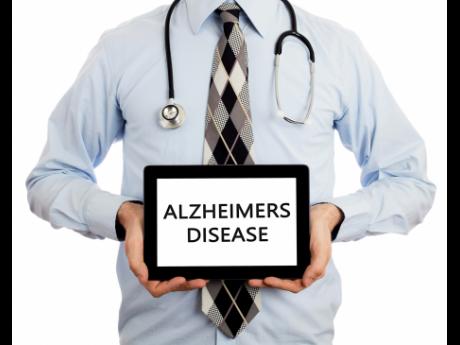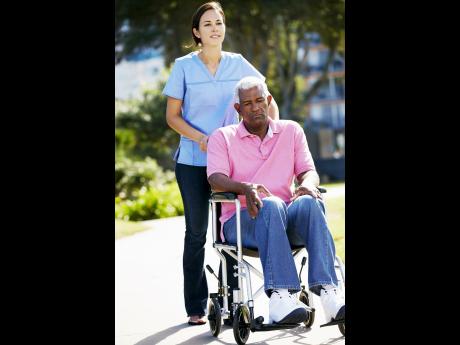Sandra Latibeaudiere | There’s no ignoring dementia
You've seen the notices on the TV or on social media. There's a photo of an older person with the police asking for help in finding the person's relatives or the relatives are asking for the public's help in finding him or her.
Maybe you barely glance at the photo. Maybe you pause because the person reminds you of a neighbour or family member. Sometimes there's good news that the person has been found and returned to their home. At other times, the news is not so good - the person's body has been found in some strange and distant location.
I have felt the pain of dementia and seen the confusion and sorrow when an older person you have always looked up to forgets who you are and acts in bewildering and even embarrassing ways.
As a social worker and a member of Alzheimer's Jamaica, a non-governmental organisation that seeks to raise awareness of, and supports people living with the disease and their caregivers, I witness first-hand the range of emotions experienced by families dealing with the disease.
Most times, both the caregiver and the person with the disease feel hurt and isolated because friends and sometimes family members stop calling and visiting, because they don't quite know how to handle the situation.
It is hard to see someone you know and love become a shadow of his or her former self.
There's the embarrassment of people finding out that a parent or other relative has been diagnosed with dementia. Sometimes, family members keep the affected parent or relative locked away. They fear what people might be saying behind their backs and how the knowledge that a family member has dementia might affect their social status.
There are two sides to the coin of ageing. Sometimes ageing is depicted as the freedom to be eccentric, unconstrained by society's norms. On the other hand, ageing is means loss of memory or speech, an inability to plan, personality changes, and an inability to perform routine daily tasks.
We often don't realise that the period we call 'old age' now extends for 25, 30, and even 40 years. Most people will go through this period with relatively little difficulty. There may be an increase in aches and pains, but most will cope. A small but growing number will walk into that web of not just loss of memory, but loss of abilities integral to being recognised as human.
This is Alzheimer's disease, one of the causes of dementia. Dementia is a collection of symptoms. It involves a decline in memory or thinking skills. Alzheimer's accounts for 50-60 per cent of cases of dementia, but there are other types. These include vascular dementia, Parkinsonian dementia, Lewy Body dementia, and frontal-temporal dementia.
Dementia is not a 'normal' part of ageing, and occasional lapses of memory are not a sign of dementia. However, the likelihood of the occurrence and prevalence of dementia and Alzheimer's disease does increase with age.
The 'oldest old', persons aged 80 years and older, are the fastest-growing age group in Jamaica. This group has a 47 per cent increased risk of developing the disease.
The Jamaican Census 2011 reported that approximately 59,140 persons were over 80 years. They represented 2.19 per cent of the total population. This figure could more than double by 2030.
In 2013, BUPA, an international healthcare group, published a report which said that there were 19,000 persons in Jamaica living with dementia in 2010. It was projected that this number would increase to 31,000 persons by 2030.
Alzheimer's disease is an insidious, progressive, degenerative, and incurable condition. In its early stages, the disease affects the person's memory and thinking to the extent that it interferes with their social interactions.
At that stage, the person with dementia may display confusion and have trouble handling money, expressing themself, making decisions, and organising his or her thoughts. As the disease progresses, persons with dementia exercise poor judgement or behave in socially inappropriate ways and lose their ability to communicate, to recognise family, and to care for themselves.
Alzheimer's is an equal opportunity disease. It affects people from all socioeconomic backgrounds.
This means that at some time in your life, you will come into contact with the disease if you have not done so already. Early diagnosis is critical. It allows the person to plan for their care. There are medications that can help to slow the progress of the disease.
Although scientists have not yet found a cure for any of the dementias, there is evidence that healthy behaviour can help to reduce the risk. You're already familiar with several of them because they are the same for conditions like diabetes and hypertension. Some that are particularly related to dementia include:
• Staying socially active: We should not only have friends our own age, but keep company with those who are younger than we are.
• Challenging our brains: Go back to school. Get the subjects you weren't able to when you were younger. Learn a new skill or language.
Alzheimer's Jamaica is lobbying the Jamaican Government to treat dementia as a non-communicable disease (NCD), so that more resources and attention can be allocated to it, as is done for diabetes and hypertension.
We would like to see the Government lead the charge in developing a national dementia strategy using the principles of the World Health Organization Global Action Plan, which Jamaica adopted in May 2017.
This disease cannot remain under the radar - under-detected, under-diagnosed, underdisclosed, undertreated, and undermanaged. As we continue to live longer, let it be done gracefully and with dignity.
- Sandra Latibeaudiere, is director of programmes for Alzheimer's Jamaica and a lecturer in Social Work at the UWI, Mona. Contact Alzheimers Jamaica via WhatsAp or phone 876-881-6370, or email them at: info@alzheimersjamaica.org.


